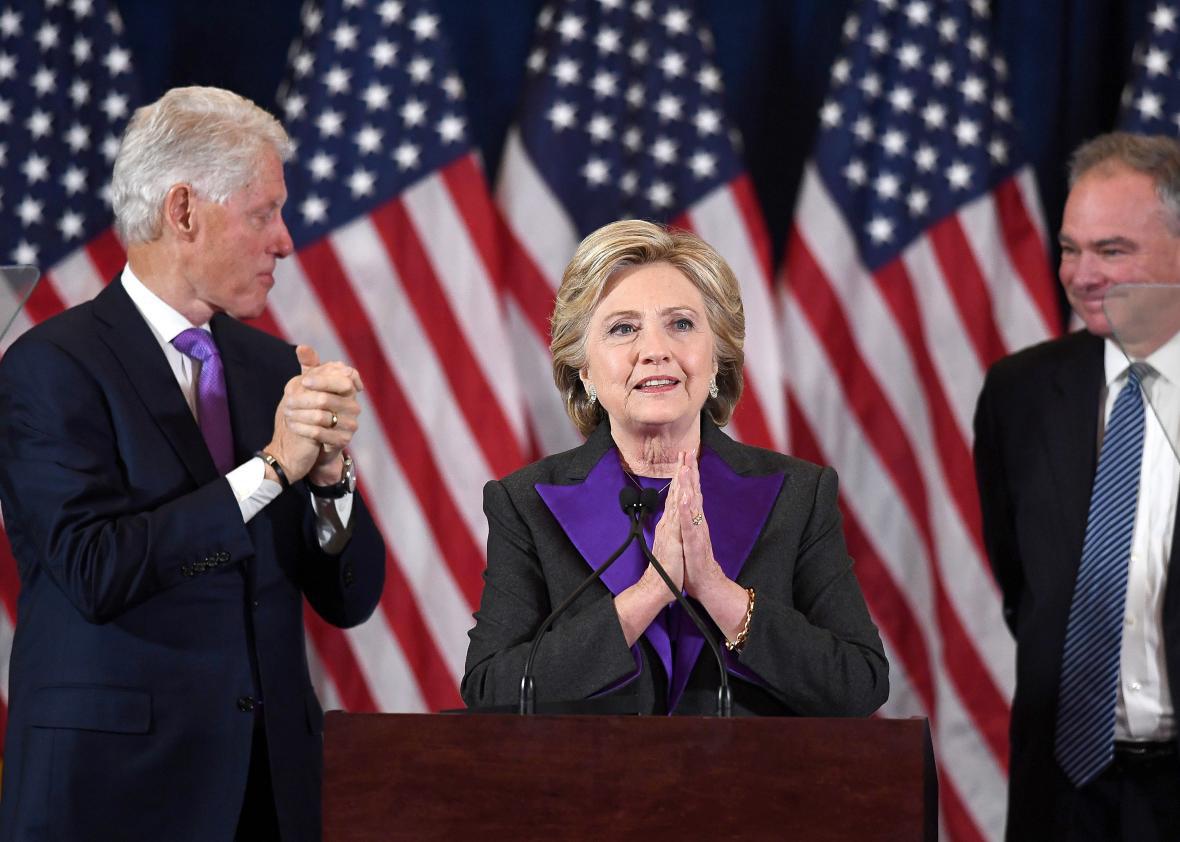Hillary Clinton is the most accomplished female public servant in American history, a trailblazing feminist who took two stabs at breaking the highest glass ceiling. Yet as we descend deeper into the era of Donald Trump, I have a sinking feeling that she will be remembered, more than anything else, for the toxic, dangerous, and deceptive concession speech she delivered on Wednesday. My colleague Christina Cauterucci praised this speech, but with respect, I question the notion that it served the right purposes. If the United States now descends into a kind of quasi-autocracy, where most people can still vote but the ruling party they elect freely cracks down on dissent and civil liberties—as I expect will soon happen—Clinton’s awful speech will have marked the moment when Democrats decided to legitimize and normalize Trump’s dangerous reign.
Masha Gessen, a lesbian, Jewish, Russian American dissident (and Slate contributor), understands this better than anyone. On Thursday, Gessen terrified the internet with an excellent article titled “Autocracy: Rules for Survival.” Gessen is one of Russian President Vladimir Putin’s chief critics and, thus, enemies; it is not at all an overstatement to say that she has repeatedly risked her life to speak out against Putin. Some critics slammed Gessen’s piece as a melodramatic overreaction. I could not disagree more. Gessen is perhaps the first mainstream American journalist who refuses to underestimate the extraordinary threat that Trump poses to the American experiment. When she warns us, we should listen.
Gessen uses Clinton’s concession speech as her starting point—a necessary choice, given that this speech helped to set the tone for the strangely conciliatory and reassuring attitude that many liberals have adopted. “We must accept this result and then look to the future,” Clinton said. “Donald Trump is going to be our president. We owe him an open mind and the chance to lead.” President Barack Obama echoed this sentiment, asserting that “we are now all rooting for his success in uniting and leading the country” and that “we’re actually all on one team.”
No, we are not. Donald Trump has promised to ban Muslims from entering the country and deport millions of people. He has threatened to loosen protections for freedom of speech and punish the press for criticism. He has boasted of committing sexual assault and said women who obtain abortions must be punished. He wishes to revive torture as an acceptable tactic, force the military to commit war crimes, and imprison his political opponents. The Trump we have seen so far is a vicious, vindictive, unhinged autocrat with no respect for the rule of law. He is a Putin-esque strongman whose party controls Congress and, soon, the judiciary.
Clinton’s speech, Gessen writes, rests on the presumption that Trump will immediately “repudiate almost everything he has stood for during the campaign. In short, it is treating him as a ‘normal’ politician”—which he certainly is not. “More dangerously,” Gessen notes, both “Clinton’s and Obama’s very civil passages … seemed to close off alternative responses to his minority victory” and omitted any “call to action.” Why is this so toxic? Gessen explains: “One of the falsehoods in the Clinton speech was the implied equivalency between civil resistance and insurgency. This is an autocrat’s favorite con, the explanation for the violent suppression of peaceful protests the world over.”
This statement seems indisputable, especially after Trump slammed the protests against his election as “unfair” and claimed they were being “incited by the media.” And Gessen’s other “rules for survival” are equally wise. Take the autocrat at his word. Do not rely on institutions to preserve normalcy; they are less stable than you think. Be outraged and refuse to compromise. The undercurrent of Gessen’s piece is this: Our way of life is under threat. Resist the “impulse to normalize,” and “maintain one’s capacity for shock.” Right now, these rules may sound “unreasonable and hysterical.” Soon enough, they will not. Not if you’re paying attention.
We live in dangerous times. Already we have seen a huge surge in the persecution of the very minorities whom Trump and his supporters target. Thousands of people—gay, trans, female, Hispanic, Muslim, Jewish—have been subjected to violence and harassment based on their identity in the wake of Trump’s victory. Angry, hateful people have been emboldened and empowered. This moment is unlike anything most Americans have experienced before. No, there will not be gas chambers. There will probably not be internment camps. But death squads? What else to call the work of police forces who, freed from Justice Department and judicial oversight, increasingly militarized and unconstrained by constitutional limits, can make the killing of Freddie Gray look like a practice run?
Clinton owed it to her supporters to warn them of this impending collapse of the norms fundamental to a liberal democracy. Instead, she acted as though the election of Trump was business as usual. It wasn’t, and it’s perilous to pretend otherwise. Yes, Trump is “our president,” in the sense that he won the election. But recognizing that fact does not require us to buy into the fantasy that his inevitable lawlessness will be legitimate. We should steel ourselves for a ghastly new era of violence and repression, ushered in by the consolidation of power around an autocratic maniac and his pathetic enablers. As Gessen admits, this may sound hysterical. Maybe it is. I’d like to think I’m wrong. I do not think I am.
